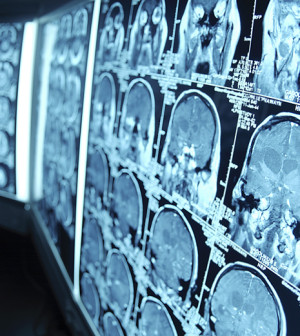- Double Mastectomy May Offer No Survival Benefit to Women With Breast Cancer
- Toxic Lead Found in Cinnamon Product, FDA Says
- Certain Abbott Blood Sugar Monitors May Give Incorrect Readings
- Athletes Can Expect High Ozone, Pollen Counts for Paris Olympics
- Fake Oxycontin Pills Widespread and Potentially Deadly: Report
- Shingles Vaccine Could Lower Dementia Risk
- Your Odds for Accidental Gun Death Rise Greatly in Certain States
- Kids From Poorer Families Less Likely to Survive Cancer
- Tough Workouts Won’t Trigger Cardiac Arrest in Folks With Long QT Syndrome
- At-Home Colon Cancer Test Can Save Lives
Scientists Gain Genetic Insight Into Alzheimer’s Disease


FRIDAY, Sept. 27Researchers who identified two more gene mutations that increase a person’s risk of developing late-onset Alzheimer’s disease say their findings from studies with mice may help in efforts to prevent and treat the disease in humans.
The rare mutations occur in a gene called ADAM10 and are linked to the common form of Alzheimer’s that strikes after age 60. This is the second gene confirmed to play a role in late-onset Alzheimer’s and the fifth gene overall linked to the disease, according to the Massachusetts General Hospital researchers.
They found that the two mutations in ADAM10 increased production and accumulation of the beta-amyloid protein in the brains of mice. Beta-amyloid plaques are found in the brains of people with Alzheimer’s disease.
The mutations also reduce creation of new nerve-related cells in the hippocampus, a part of the brain essential to learning and memory.
The study appears in the October issue of the journal Neuron.
“This is the first report to document, in animal models, new [disease-causing] gene mutations for Alzheimer’s since the reports of the original four genes in the 1990s,” study senior author Rudolph Tanzi, director of the genetics and aging unit at the MassGeneral Institute for Neurodegenerative Disease, said in a hospital news release.
“What we found regarding the many effects of these two rare mutations in ADAM10 strongly suggests that diminished activity of this enzyme can cause [Alzheimer’s disease], and these findings support ADAM10 as a promising therapeutic target for both treatment and prevention,” he said.
Scientists note, however, that research with animals often fails to provide similar results in humans.
More information
The U.S. National Institute on Aging has more about Alzheimer’s disease.
Source: HealthDay
Copyright © 2024 HealthDay. All rights reserved.










